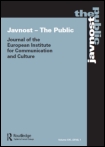Abstract
Taking EU communications as a case study this article deals with the relationship between communication activities of public authorities and the public sphere. Traditional theories of the public sphere regard government communications as an unwelcome intervention that distorts free and open debates. This article argues that public relations activities of governments should be analysed as being part of the implementation of an information policy that also comprises citizen’s rights of access to documents and information. Whether information policy distorts or supports free deliberation is an empirical question that is answered by looking at the information policy of the European Commission since the year 2000. In response to the challenge of communicating Europe to largely disinterested audiences, the European Commission has reformed its communications in order to foster a European public sphere through enhancing the transparency of European governance and starting a dialogue with the citizens. The study shows that the EU fails on its promise of dialogue and that transparency could still be improved. The information policy of the Commission aims at normatively acceptable goals while using ineffective means. Information policy does not turn out to be propagandistic but ineffective. Focussing on media relations could make PR more effective in reaching out to the wider public. If journalism functions as its necessary corrective and citizens are empowered through strong rights of access to information, than information policy could contribute to a vivid transnational public sphere.

Brüggemann, Michael (2010): Information Policy and the Public Sphere. EU Communications and the Promises of Dialogue and Transparency. In Javnost / The Public 17 (1), pp. 5–21. Available online at https://doi.org/10.1080/13183222.2010.11009023.
